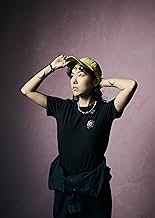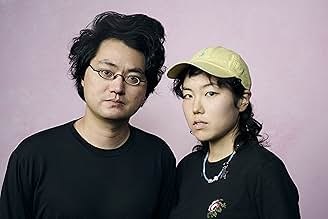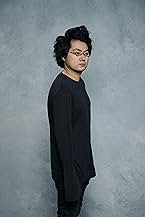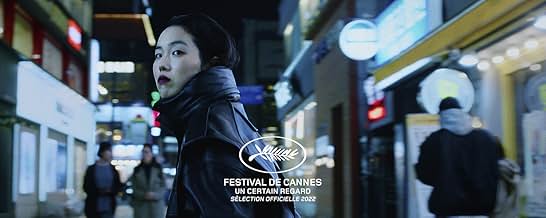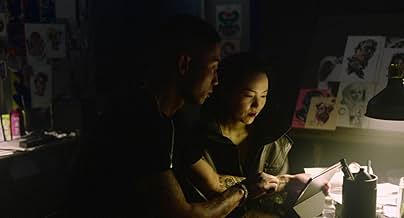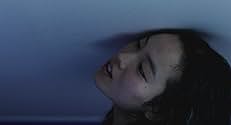AVALIAÇÃO DA IMDb
6,9/10
10 mil
SUA AVALIAÇÃO
Uma francesa de 25 anos retorna, pela primeira vez, à Coreia, país em que nasceu antes de ser adotada por um casal francês. Ela decide rastrear seus pais biológicos, mas sua jornada toma um ... Ler tudoUma francesa de 25 anos retorna, pela primeira vez, à Coreia, país em que nasceu antes de ser adotada por um casal francês. Ela decide rastrear seus pais biológicos, mas sua jornada toma um rumo surpreendente.Uma francesa de 25 anos retorna, pela primeira vez, à Coreia, país em que nasceu antes de ser adotada por um casal francês. Ela decide rastrear seus pais biológicos, mas sua jornada toma um rumo surpreendente.
- Direção
- Roteiristas
- Artistas
- Prêmios
- 10 vitórias e 25 indicações no total
Heo Jin
- Grandmother
- (as Jin Heo)
Régine Vial
- Gisèle Benoît
- (as Régine Vial Goldberg)
Shin Dong-ho
- Tena's Father
- (as Dong-ho Shin)
Avaliações em destaque
The film offers a fresh and nuanced perspective on the complexities of identity, home, and emotional upheaval. The central character's multi-year quest to return to her place of birth serves as an intense focal point for exploring the intricate emotions and challenges related to adoption and self-discovery. However, a minor drawback lies in the occasional reliance on clichés, which briefly detract from the otherwise innovative approach.
The narrative structure stands out for its inventiveness, seamlessly weaving multiple timelines in a way that enriches the emotional landscape. The fragmented narrative is both audacious and purposeful, reflecting the protagonist's evolving inner world.
Beyond visual appeal, the film's cinematography serves as a narrative tool, adding layers of meaning to characters and themes. The score acts as the emotional backbone, elevating key moments and offering another layer to the viewer's experience.
In summary, the film emerges as a deeply affecting and intellectually stimulating exploration of identity, adoption, and the pursuit of true belonging. With its compelling storytelling, captivating performances, and visually arresting cinematography, it provides not just entertainment but a profound cinematic experience.
The narrative structure stands out for its inventiveness, seamlessly weaving multiple timelines in a way that enriches the emotional landscape. The fragmented narrative is both audacious and purposeful, reflecting the protagonist's evolving inner world.
Beyond visual appeal, the film's cinematography serves as a narrative tool, adding layers of meaning to characters and themes. The score acts as the emotional backbone, elevating key moments and offering another layer to the viewer's experience.
In summary, the film emerges as a deeply affecting and intellectually stimulating exploration of identity, adoption, and the pursuit of true belonging. With its compelling storytelling, captivating performances, and visually arresting cinematography, it provides not just entertainment but a profound cinematic experience.
I saw this film yesterday and I thought that it's an original and unique film, but somewhat difficult to enjoy. An issue that many people have is that they can't connect to Freddy, the main character, and I get why. Her behaviour is often erratic, and then at times repelling and harsh to others. As she really takes centre stage in this film, it can be hard even for the spectator to put up with her behaviour, even though it is nowhere near outright evil. I thought a bit more about this, and will share my view of it. I won't reveal any detail of the film that you can't find in any generic introduction, so no spoilers, however if you want to watch this and build your own understanding unaffected by my interpretation, you may not want to read on.
I actually know well a person in a similar situation to Freddy, somebody from outside Europe who was adopted to Europe at the age of half a year. There are clear parallels also in behaviour. Being abandoned is a primal experience for adopted children. In these cases an additional thing is that the environment can clearly see that the parents are not the biological parents, and some may think the child "doesn't belong" in the country to where it was adopted. This will add to their experience of being somewhat odd and maybe not really accepted, even though the adoptive parents themselves may not convey anything of that kind. What I see in Freddy is a very strong tendency to keep up and defend her own independence fiercely, particularly if somebody else gets closer. The biological parents have given her away, so it is hard to handle and accept for her if she meets them again and they want some closer contact. I think there is much fear of being abandoned again involved. She may also have tried extra hard to become a proper French person when growing up, potentially facing some prejudice but also encouragement there, and she may identify South Korea as a place that abandoned her, even though there is also curiosity and a certain feeling of connection that she has difficulties allowing for herself. So she develops this rather ambivalent relationship to South Korea and the people there, sometimes behaving extra strange, sometimes getting closer, then again wanting to run away when indeed somebody gets a bit closer. There may also be an element of trying to prove life wrong, trying to show to herself that ultimately she isn't rejected by South Korea and her biological parents, but with a lot of suspicion and self protection at the same time. So thinking about this a bit longer, ultimately her behaviour makes a lot of sense to me, even in its superficial inconsistency.
So after a day I think this is actually very well done and convincing, and I'll give it 8 stars, even though I hadn't felt like that yesterday when the film ended. Note, explanations are not normally given in the film. She does what she does but she really isn't communicative about her motives, so we can only speculate. But it makes all sense to me, given also my personal knowledge of such a person.
I actually know well a person in a similar situation to Freddy, somebody from outside Europe who was adopted to Europe at the age of half a year. There are clear parallels also in behaviour. Being abandoned is a primal experience for adopted children. In these cases an additional thing is that the environment can clearly see that the parents are not the biological parents, and some may think the child "doesn't belong" in the country to where it was adopted. This will add to their experience of being somewhat odd and maybe not really accepted, even though the adoptive parents themselves may not convey anything of that kind. What I see in Freddy is a very strong tendency to keep up and defend her own independence fiercely, particularly if somebody else gets closer. The biological parents have given her away, so it is hard to handle and accept for her if she meets them again and they want some closer contact. I think there is much fear of being abandoned again involved. She may also have tried extra hard to become a proper French person when growing up, potentially facing some prejudice but also encouragement there, and she may identify South Korea as a place that abandoned her, even though there is also curiosity and a certain feeling of connection that she has difficulties allowing for herself. So she develops this rather ambivalent relationship to South Korea and the people there, sometimes behaving extra strange, sometimes getting closer, then again wanting to run away when indeed somebody gets a bit closer. There may also be an element of trying to prove life wrong, trying to show to herself that ultimately she isn't rejected by South Korea and her biological parents, but with a lot of suspicion and self protection at the same time. So thinking about this a bit longer, ultimately her behaviour makes a lot of sense to me, even in its superficial inconsistency.
So after a day I think this is actually very well done and convincing, and I'll give it 8 stars, even though I hadn't felt like that yesterday when the film ended. Note, explanations are not normally given in the film. She does what she does but she really isn't communicative about her motives, so we can only speculate. But it makes all sense to me, given also my personal knowledge of such a person.
Return to Seoul is a captivating film that presents an intimate and complex portrayal of Freddie, although the larger context of her life is missing. However, the film's commitment to staying in the moment keeps the audience engaged. While the film does not have a strong emotional impact, it remains focused on Freddie's search for her identity and origins. Nevertheless, the movie lacks originality and does not distinguish itself from other films with similar themes. Despite this, Return to Seoul is still a well-made film that provides a compelling character portrait, albeit with some rambling sequences that do not add much to the story.
I could not watch this film without any expectation or prejudice, as I know someone who has a sibling that is an adopted Korean child. However I still tried to keep an open mind, and I think the film is executed well.
Freddie is the only character that is really fleshed out and I think that's right. There are several other characters, notably Freddie's father, that are treated with respect by the film but they are not given a lot of depth. But since it's not their story that is being told they all have to take a back seat to the little girl that it's all about.
After watching this I did a little digging and I found that adoption, foreign or not, is culturally, politically and therefore historically laden in South Korea. You have to want to go looking for it as the film does not push the subject too heavily, but it certainly has several scenes referring to this subject from the institutional rather than the personal viewpoint.
I do think the film has some problems in finding the right tone and there are segments that do not help progress the story. The whole birthday party segment might be nicely shot but does not really add anything.
All in all it's a good film and it triggered me to learning a bit more about its subject matter.
Freddie is the only character that is really fleshed out and I think that's right. There are several other characters, notably Freddie's father, that are treated with respect by the film but they are not given a lot of depth. But since it's not their story that is being told they all have to take a back seat to the little girl that it's all about.
After watching this I did a little digging and I found that adoption, foreign or not, is culturally, politically and therefore historically laden in South Korea. You have to want to go looking for it as the film does not push the subject too heavily, but it certainly has several scenes referring to this subject from the institutional rather than the personal viewpoint.
I do think the film has some problems in finding the right tone and there are segments that do not help progress the story. The whole birthday party segment might be nicely shot but does not really add anything.
All in all it's a good film and it triggered me to learning a bit more about its subject matter.
What stands out the most about this film is its refusal to take the easy route. While viewers may think they can predict the direction after the first act, they are mistaken. The narrative defies predictability, mirroring the unpredictable nature of wounded souls and those who never feel truly at home.
The protagonist's actions may seem foolish, but what truly captivates is the striking humanity portrayed with raw realism, making it impossible to abandon the desire and hope for her to find solace within. I was left speechless when I found out that this is Ji-Min Park's debut role. A role that made me shed tears on more than one occasion and that is her merit in making us see so well that everything she is, is the result of her life's circumstances.
The experiende Oh Gwan-rok, in the role of the biological father, is also outstanding, but this is not just a film of performances. It boasts brilliant scenes, expertly paced storytelling, daring technical choices, and a secure, risk-taking direction, all complemented by a flawless soundtrack.
PS: The main theme of this and the one of "Decision to Leave" are two haunting melodies that linger in my mind, compelling me to delve deeper into the history of South Korean music.
The protagonist's actions may seem foolish, but what truly captivates is the striking humanity portrayed with raw realism, making it impossible to abandon the desire and hope for her to find solace within. I was left speechless when I found out that this is Ji-Min Park's debut role. A role that made me shed tears on more than one occasion and that is her merit in making us see so well that everything she is, is the result of her life's circumstances.
The experiende Oh Gwan-rok, in the role of the biological father, is also outstanding, but this is not just a film of performances. It boasts brilliant scenes, expertly paced storytelling, daring technical choices, and a secure, risk-taking direction, all complemented by a flawless soundtrack.
PS: The main theme of this and the one of "Decision to Leave" are two haunting melodies that linger in my mind, compelling me to delve deeper into the history of South Korean music.
Você sabia?
- CuriosidadesThe movie is based on the life of Laure Badufle, a friend of director Davy Chou. Like Freddie, she was born in South Korea, stayed a year there before being adopted in France. At age 23, she came back and lived for two years there before returning to France. A few years after that, Chou accompanied her to South Korea, when they met her biological father and grandmother. According to him, the meeting was full of emotions, of regret and bad communication, with the translator struggling to convey Badufle's anger into polite Korean.
- Trilhas sonorasPetals
Written by Shin Jung-Hyun
Performed by Lee Junh-Hwa
Principais escolhas
Faça login para avaliar e ver a lista de recomendações personalizadas
- How long is Return to Seoul?Fornecido pela Alexa
Detalhes
- Data de lançamento
- Países de origem
- Central de atendimento oficial
- Idiomas
- Também conhecido como
- Return to Seoul
- Locações de filme
- Empresas de produção
- Consulte mais créditos da empresa na IMDbPro
Bilheteria
- Orçamento
- € 2.200.000 (estimativa)
- Faturamento bruto nos EUA e Canadá
- US$ 798.774
- Fim de semana de estreia nos EUA e Canadá
- US$ 27.315
- 19 de fev. de 2023
- Faturamento bruto mundial
- US$ 2.175.376
- Tempo de duração
- 1 h 59 min(119 min)
- Cor
- Proporção
- 1.85 : 1
Contribua para esta página
Sugerir uma alteração ou adicionar conteúdo ausente




